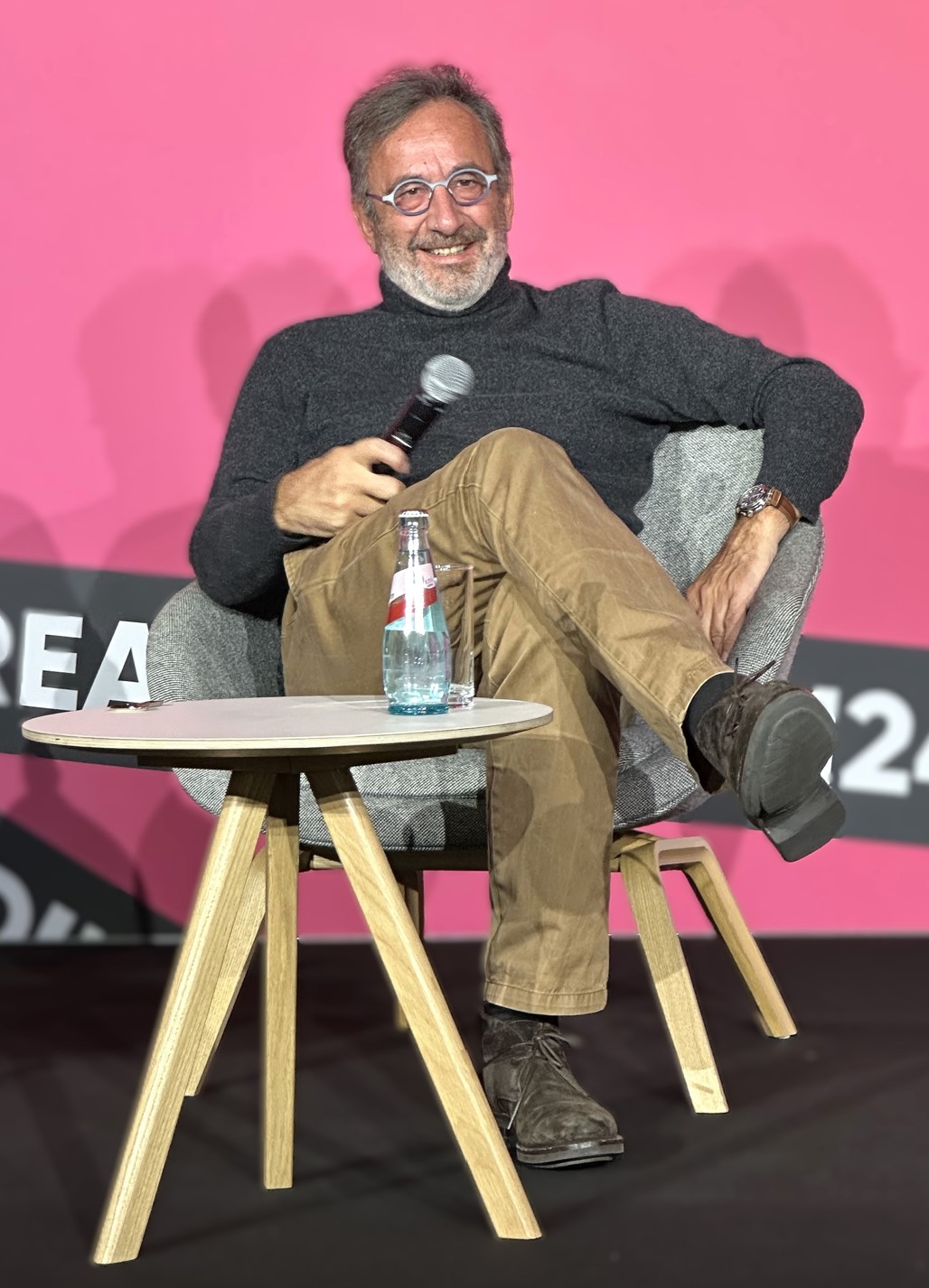Frankfurt 2024: Arnaud Nourry on Les Nouveaux Éditeurs
 Arnaud Nourry, former global CEO of Hachette Livre, discussed his new venture, Les Nouveaux Éditeurs, in conversation with Publishing Perspectives editor-in-chief Porter Anderson at the Frankfurt Book Fair last week.
Arnaud Nourry, former global CEO of Hachette Livre, discussed his new venture, Les Nouveaux Éditeurs, in conversation with Publishing Perspectives editor-in-chief Porter Anderson at the Frankfurt Book Fair last week.
Nourry, who left Hachette Livre in 2021, announced Les Nouveaux Éditeurs this past June, following three years of semi-retirement and the end of a non-compete agreement he signed with Hachette. He described Les Nouveaux Éditeurs as something of an incubator for talented editors looking to start their own imprints. From LNE they receive help with funding, sales, and distribution, while, Nourry added, having "full independence."
 |
|
| Arnaud Nourry | |
That agreement, he emphasized, is "legally binding for us," and LNE will have "no right to interfere" with an imprint's publishing plan. The commitment is also for the long term, with Nourry noting that eventually, once these imprints have found success, "we buy them out before they retire."
Nourry pointed to several factors in the French publishing landscape that led him to launch LNE. One factor was the rate at which family-owned companies were being sold to larger conglomerates. Another factor was the desire to help maintain publishing's role as "one of the key voices in public debate" in France. And, finally, he had observed that there are new publishing ventures launched every year by people in their 30s, but hardly any by experienced professionals in their 40s and 50s.
People at that stage of life, he elaborated, "can't afford to not get paid." His hope is that LNE makes the prospect less risky and more appealing for the "most talented people" of that generation of publishers.
He remarked too that in France, people love to celebrate publishers like Hachette, which have histories lasting centuries. But if people want to celebrate more publishers' 100th anniversaries, he said, "we need to create them today. We cannot celebrate legacy imprints without creating new ones."
LNE announced its first imprint a few weeks ago, and Nourry expects to announce another handful before the start of the first quarter 2025. Nourry said LNE is not looking for imprints that fill specific niches such as romance or manga, because that "never works." Instead they are "just looking for talent" in any category save textbooks and education.
When Anderson compared LNE with Authors Equity, the new venture founded by Madeline McIntosh, Nina von Moltke, and Don Weisberg, Nourry agreed there are some similarities, but also key differences given the different publishing landscapes. In the U.S., where the role of the agent is "much, much bigger," authors are the "key talent." In France, where the agent community is not so massive, editors are the talent. He remarked: "They come with authors."
Asked whether his experience running Hachette Livre directly inspired the LNE model, Nourry said no, explaining that "when you run a company publishing 17,000 books in 10 languages," there was "no spare time" to "think about ways to operate differently."
He called it "fascinating" to approach running a publishing company with a blank slate, and said it makes it easier to implement things like AI processes, which could be disruptive in an established workplace. Elaborating on the uses of AI, he said there was "a lot to be done" in digital marketing, producing commercial documentation, pitching to foreign markets, logistics, and deciding on print runs.
Touching on rapidly changing reader habits and demographics, Nourry said that tomorrow's readers will not resemble the readers of the last 25 years, and he cautioned the industry to be very careful about not repeating the "same schemes" and same editorial tastes that it has relied on for decades. Otherwise, publishing will become a "club of editors" publishing books only they want to read. He also doubted that marketing is all publishers will have to rely on; rather, success will come from hiring talented editors from diverse backgrounds.
Commenting on the resilience of French bookselling, Nourry mentioned the laws passed in the early 1980s that barred discounting books. Readers may have a preference for one retailer or another, but it is not because of prices. While things like rising rents or inflation may challenge bookstores from time to time, the pricing laws make France "immune to a massive change in the ecosystem," he argued.
He recalled that while at Hachette, the company served around 10,000 accounts in France alone, and despite the difference in population between the two countries, France has roughly the same number of indies as the United States.
"I think we're happy guys in the French market, for sure," Nourry said. --Alex Mutter











 The cafe and bookstore, which sells a variety of new and used titles, will remain in the Clifton Park Center Mall but switch to a space in the mall's food court that has both indoor and outdoor entrances.
The cafe and bookstore, which sells a variety of new and used titles, will remain in the Clifton Park Center Mall but switch to a space in the mall's food court that has both indoor and outdoor entrances.


 The Bookstore Plus
The Bookstore Plus American Rapture
American Rapture In her insightful, multilayered debut novel, The Magnificent Ruins, playwright and television executive Nayantara Roy turns her storytelling skills to a new form: the intergenerational family saga. Set in the wealthy Ballygunge neighborhood of Kolkata, Roy's narrative unfurls the story of the wealthy Lahiri family through the eyes of its American granddaughter and reluctant heiress, Lila De.
In her insightful, multilayered debut novel, The Magnificent Ruins, playwright and television executive Nayantara Roy turns her storytelling skills to a new form: the intergenerational family saga. Set in the wealthy Ballygunge neighborhood of Kolkata, Roy's narrative unfurls the story of the wealthy Lahiri family through the eyes of its American granddaughter and reluctant heiress, Lila De.